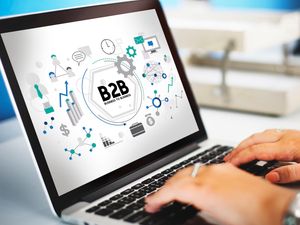A B2B (business-to-business) marketplace is an online platform where companies buy and sell products or services to other companies. Unlike B2C (business-to-consumer) platforms, which target individual buyers, B2B marketplaces are built for commercial transactions between manufacturers, wholesalers, distributors, retailers, and service providers.
These exist to simplify the purchase processes for the market, improve the supplier's search, reduce the cost of transactions and enable businesses more efficiently. Platforms such as Alibaba, Amazon Business and Thomasnet have paved their way to cross the border and domestic B2B trade through digital ecosystems.
The B2B market includes almost all industries including production, agriculture, medical supply, electronics, logistics and office services. They quickly change traditional procurement and supply chain methods by offering openness, automation and competitive prices.

Meaning - Why B2B Marketplace means something today
B2B marketplaces have become important tools for global trade, especially digital changes accelerates industries. Their meaning lies in their ability to solve major challenges:
-
Skilled purchase: Companies can compare several suppliers in one place, reduce manual purchases and improve the decision.
-
Cost savings: Through competition and direct access, buyers often ensure better prices and low overhead costs.
-
Market expansion: Sellers can use extensive target groups without geographical boundaries.
-
Automation: Transactions, logistics and invoices are often integrated into platforms, saves time and reduced human error.
These marketplaces are especially useful for:
-
Small medium-sized businesses (SMB) on scale
-
Professional administration of large suppliers network
-
Manufacturer raw materials or parts source
-
Service-based business in search of B2B clients
In 2025, B2B e-commerce is estimated to be more than $25 trillion globally, reflecting its growing dominance in the global supply chains.
Recent update - trends and development last year
Last year (2024–2025), many significant changes and trends in the B2B Marketplace Landscape have occurred:
Vertical market
-
Vertical marketplace (specialized in industry) has gained popularity.
-
Example: wholesale products for stores, Foodbius Hospitality Supply in Australia
-
These platforms meet business requirements with analogous services, support and pricing models.
AI and integration of automation
-
The AI tool is quickly integrated into platforms for product recommendations, scam detection, price forecast and customer assistance.
-
Platforms such as Alibaba and Indiamart now offer AI-based purchasing suggestions and chatbots.
Sustainability focus
-
Several B2B platforms highlight lasting sourcing, carbon tracking and moral suppliers when companies focus on ESG (environment, social and governance) standards.
Mobile customization
-
Demand for mobile-friendly B2B solutions has increased, especially in growth economies.
-
Apps are now used to order, track and manage real-time situations.
The supply chain flexibility
-
Due to ongoing disorder (such as geopolitical stress and climate-related events), B2B platforms have added functions such as alternative supplier mapping and lead time calculator.
Law or Guidelines - Regulatory impact on B2B Marketplace
B2B Marketplace is influenced by various legal and regulatory structures based on region. These laws often address areas such as data security, fair trade practice, taxation and international trade.
Data privacy
-
GDPR (EU): The B2B market that handles EU data is required to follow data security laws including consent and user rights.
-
CCPA (California): Equal protection for companies and individuals in California.
E-invoice and tax regulations
-
In countries such as India and Brazil, e-invoicing is now mandatory for several B2B transactions, which helps to comply and carry records.
Continuous purchase policy
-
Some governments (e.g., the EU green procurement program) encourage or mandate sustainable buying practices, which are adapted to B2B platform support.
Tools and Resources - Assistant Forum and Solution
Different types of platforms, apps and tools are available to help companies navigate and take advantage of the B2B Marketplace.
Major Global Market
-
Alibaba: One of the largest global B2B trade platforms
-
Amazon Business: Suited for office, IT and industrial supply
-
Indiamart: Domestic B2B in India for business
-
Made-in-china.com: Ideal to buy from Chinese manufacturers
Tools for Management and Optimization
-
SAP Ariba: Procurement and supply chain collaboration
-
TradeGecko (QuickBooks Commerce): Inventory and order management
-
Handshake: B2B eCommerce platform for wholesale ordering
-
Zoho Inventory: Multi-channel inventory control and fulfillment
-
Customs Info Database (by Descartes): HS codes and tariff data for international shipping
Sustainability and compliance
-
ECOVADIS: Supplier's sustainability assessment
-
SEDEX: Ethical business data platform
-
Greenbies Equipment: Corporate Responsibility and ESG Scheme
Common questions - general questions about B2B Marketplace
1. Is it safe to use B2B Marketplace for international trade?
Yes, but it is important to confirm suppliers, use secure payment methods and review business policy. Platforms such as Alibaba offer business insurance programs.
2. How does B2B Marketplace make money?
Most platforms work through membership schemes, transaction fees, advertising or premium supplier services.
3. Can small businesses use B2B platforms effectively?
Absolutely. B2B platforms can help SMBs by combining competitive prices and automation tools, and connecting globally with suppliers or buyers.
4. What should I consider before choosing a B2B Marketplace?
Evaluate the platform's industry focus, user base, tax structure, security functions and integration with your internal systems.
Final thoughts
B2B Marketplace continues to develop as necessary platforms for modern trade transactions. With the expectations of increasing automation, regulatory inspection and sustainability, these ecosystems are more than just trade hubs—they are strategic tools for growth and flexibility. Whether you are a start-up, manufacturer or procurement manager, understanding how to navigate the B2B market can improve efficiency and open new business opportunities.